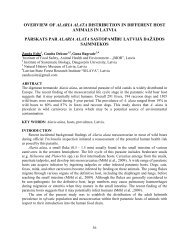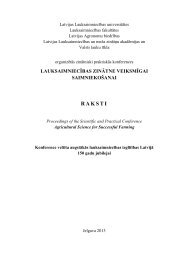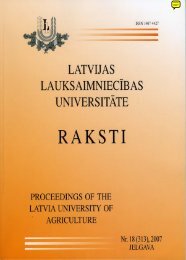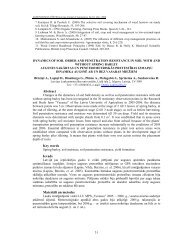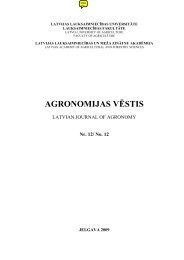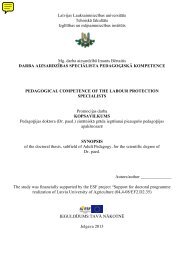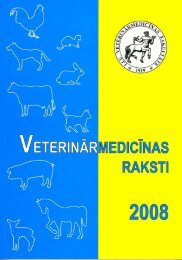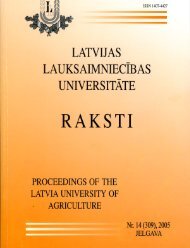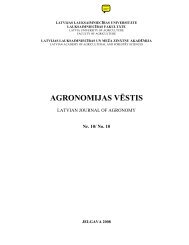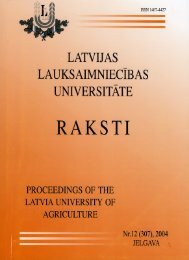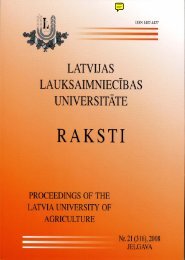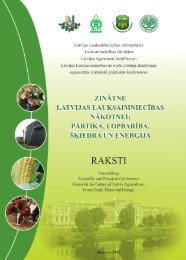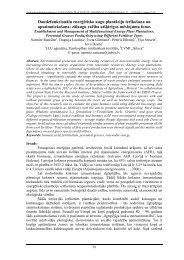Latvia University of Agriculture - Latvijas Lauksaimniecības ...
Latvia University of Agriculture - Latvijas Lauksaimniecības ...
Latvia University of Agriculture - Latvijas Lauksaimniecības ...
Create successful ePaper yourself
Turn your PDF publications into a flip-book with our unique Google optimized e-Paper software.
P. Rivža, I. Alsiņa Science at <strong>Latvia</strong> <strong>University</strong> <strong>of</strong> <strong>Agriculture</strong> –achievements and future perspectivesAt the end <strong>of</strong> 1950s and the beginning <strong>of</strong> 1960s Jelgava became an academy cityonce again.During the whole existence <strong>of</strong> the LLA, 35-40% <strong>of</strong> the teaching staff possessed ascientific degree.A notable research should be done in order to become a Doctor <strong>of</strong> Science. In 1946 theLLA obtained the authority to award scientific degrees in agriculture, forest managementand veterinary sciences, later also in agricultural technologies and economic sciences.10 – 20 dissertations (promotion works) <strong>of</strong> researchers from the university or otherinstitutions were presented every year at the Scientific Council <strong>of</strong> <strong>Latvia</strong> Academy <strong>of</strong><strong>Agriculture</strong>. At the end <strong>of</strong> 1970s councils dedicated to agriculture, engineering andeconomic sciences were established instead <strong>of</strong> the Scientific Council.Research at <strong>Latvia</strong> Academy <strong>of</strong> <strong>Agriculture</strong> dealt with actual agricultural problems,agrarian policy and the agricultural development <strong>of</strong> <strong>Latvia</strong>. At the beginning <strong>of</strong> 1960snew state financed scientific laboratories were established: substantive scientific andproblem laboratories: Plant and Insects Viral Diseases, Agricultural and IndustrialProducts Hydrothermal Treatment, Radiobiology, Milk Machine, Region Projecting andTerritorial Organization, Agricultural Manufacture and Economy, Tractor and Unit UsageLaboratory. In 1968 the Agricultural Animal Feeding Microelements Scientific Laboratorywas established.Active research work takes place at the <strong>Latvia</strong> <strong>University</strong> <strong>of</strong> <strong>Agriculture</strong> (LLU). Thepriorities <strong>of</strong> the research work have changed in the course <strong>of</strong> time; nevertheless, theyare all connected with the rural areas and agriculture <strong>of</strong> <strong>Latvia</strong>.The priority scientific directions put forward by the LLU from 1975 to 1990 include:The development and introduction <strong>of</strong> technologies in the agricultural production;– Land amelioration and chemicalization <strong>of</strong> the agricultural production;– The economic problems <strong>of</strong> agricultural and forest management intensification basedon specialization, concentration and rational utilization <strong>of</strong> funds and land resources;The automatization <strong>of</strong> the agricultural production;––The prediction <strong>of</strong> the agricultural production development.The teaching staff and scientists <strong>of</strong> all the faculties will take part in solving theseproblems. It was planned to increase the number <strong>of</strong> scientists in the problem andscientific laboratories. It is planned to turn two scientific laboratories into problemlaboratories during the time period from 1976 to 1980, which has been accomplished.Accordingly, the Plant and Insect Viral Diseases Problem Laboratory and the AgriculturalProducts Hydrothermal Treatment Problem Laboratory have been established at the<strong>Latvia</strong> Academy <strong>of</strong> <strong>Agriculture</strong>.At the early stage <strong>of</strong> <strong>Latvia</strong> Academy <strong>of</strong> <strong>Agriculture</strong> research was financed mainlyby state, but at seventies - eighties the number <strong>of</strong> scientific contracts with resorts andenterprises increased.Each year scientific- practical conference was held and regular scientific proceedings“LLA Raksti” was publishedAt 1991 <strong>Latvia</strong> Academy <strong>of</strong> <strong>Agriculture</strong> was renamed <strong>Latvia</strong> <strong>University</strong> <strong>of</strong> <strong>Agriculture</strong>(LLU). The year 1992 was a period <strong>of</strong> radical changes at the LLU. These changes wereconnected with the replacement <strong>of</strong> the Soviet system in all the fields <strong>of</strong> the country.Many normative documents were developed to reorganize and improve the quality <strong>of</strong> thestudies, research work and other spheres. In 1992 six habilitation and promotion councilsapproved by the <strong>Latvia</strong>n Council <strong>of</strong> Science started their work at the LLU embracingthe sub-sectors <strong>of</strong> agronomy, animal production, and economics within the sector <strong>of</strong>agriculture; the sub-sector <strong>of</strong> agricultural engineering within the sector <strong>of</strong> engineering;as well as the sectors <strong>of</strong> veterinary science and forestry. In 1993 the habilitation councilwithin the sector <strong>of</strong> engineering, the sub-sector <strong>of</strong> food product technology, processesand equipment, also started its work; and in 1997 – within the sector <strong>of</strong> engineering,the sub-sector <strong>of</strong> water management and land amelioration. At first the most importanttask <strong>of</strong> these councils was the equalization <strong>of</strong> the USSR academic degrees, i.e.candidate <strong>of</strong> Science and doctor <strong>of</strong> Science, and the newly adapted academic degrees<strong>of</strong> the Republic <strong>of</strong> <strong>Latvia</strong>, i.e. doctor and habilitated doctor. After the evaluation <strong>of</strong> thecontents <strong>of</strong> dissertations as well as the scientific activities <strong>of</strong> the candidates following thedissertation defence, the LLU habilitation and promotion councils equalized the academicdegrees <strong>of</strong> 358 scientists including 7 foreigners. 58 dissertations were defended atthe LLU habilitation councils from 1992 to 1998; as a result, 21 scientists attained thehabilitated doctor’s degree while 37 – the doctor’s degree. The teaching staff <strong>of</strong> the LLU<strong>Latvia</strong> <strong>University</strong> <strong>of</strong> <strong>Agriculture</strong> – 70, 2009 145



